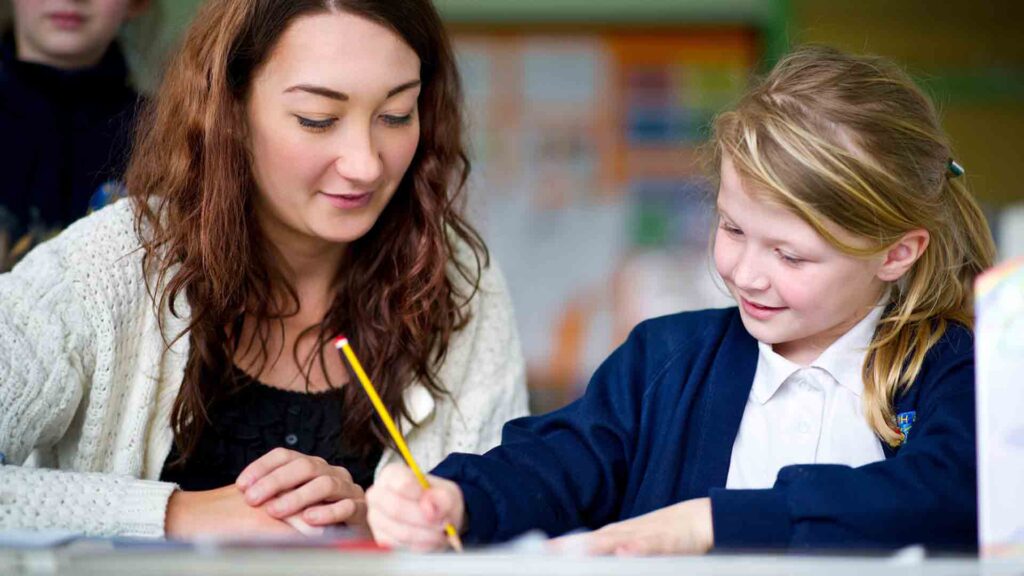PGCE Primary Mental Health and Wellbeing Specialist with QTS course preparation
To help you feel prepared for your PGCE Primary Mental Health and Wellbeing Specialist with QTS studies, we’ve put together a list of key department contacts and how to connect with them, where you can expect to learn and other tips on how to prepare for your transition to postgraduate study. Read on to find out more.
View our Padlet for further information about starting your Primary PGCE programme including a link to your course timetable.
Important: Placement guidance
Edge Hill is an English Teacher Training institution which trains teachers for the English system. In order to widen our students’ experience, and to enhance their employability, we’re sometimes able to provide Professional Practice placements outside England, in Wales, the Isle of Man and Northern Ireland. It should be noted that such distance placements aren’t guaranteed, and the government requirement is that all students complete the majority of their training in England. While we’re delighted to welcome students from all over the world onto this programme, it should be noted that we’re training primarily for the English school system. Where distance placements are possible, they’re normally offered for the developmental placement, which takes place after the Christmas break.
Student Allocation Profile
It’s time to complete your Student Allocation Profile Survey. The survey helps the Partnership Development Team find an appropriate professional practice placement for you. This is done by taking as many relevant details of your personal situation into account as possible.
Complete the surveyAlready have a contact?
If you’ve got strong links to a school where you’d like to undertake a professional practice placement, please let us know by completing our Professional Practice Allocation Form (PPAF). We’re always happy to consider these schools and have a set process in place to do so.
Complete our PPAF
Where your learning will take place:
As an education student, you’ll benefit from our two Faculty of Education buildings: Lakeside and Piazza.
Facilities in our Lakeside building include:
- a 300-seat lecture theatre
- five well-equipped ICT suites
- 18 teaching rooms complete with the latest technology
Facilities in our Piazza building include:
- Research Hub
- a lecture theatre
- a number of seminar rooms
You’ll also take on professional practice placements, where you can put what you’ve learned in the classroom into practice.
How to prepare for your transition to postgraduate study
At Edge Hill, we host a range specialist UniSkills workshops for all of our applicants to access. They’re particularly useful if you are about to enrol at Edge Hill University, or just looking to refresh your skills for the semester ahead.
We know that you’re aware that you’ll be putting in hard work to study for your course when you arrive. But it’s not just academic skills that you’ll be using once you’re here. And there are a few skills that you might want to refresh now so that you’re a pro when it comes to the start of your studies in September.
- Time management – you may have conflicting deadlines as well as other personal activities to consider. So you’ll want to make sure that you manage your time well so that you can do everything you’d like to do. But, there may be times when you can’t do it all but managing your time well will help you to prioritise which activities are necessary and which you have to miss out on.
- Critical thinking – it’s important to show your true understanding of the topics you cover in lectures. And for some of this, you’ll need to critique the work you’re studying in a professional, academic manner. You may already be completing tasks like this in your current studies, so university will be a chance to enhance these skills. Don’t be afraid to share your opinions.
- Teamwork – some modules may require you to work with others on your course to complete tasks and discuss analytical findings.
- Independent work – in contrary to the above, it’s also important to be able to work independently. The majority of your work will need to be submitted individually so it’s important to take ownership of your learning. And if there is something that you don’t understand, make sure to ask your tutor.
- Self-motivation – you’ll be encouraged to work more independently which means that you won’t have a teacher that chases you up to make sure you’ve completed a piece of work on time. So it’s important that you hold yourself accountable and make the decision to put the work in.
To remind yourself of your course content, please visit your course page:
If you’d like to complete any preparatory reading, you can search for any reading related to your course on our online reading list.

Useful websites:
Over the summer, you can also prepare for your programme by keeping up to date with the latest developments in the Education Sector. We’ve listed some useful websites, but you should also try and find additional sites of your own:
- The Times Educational Supplement
- Ofsted website
- Department for Education
- BBC Education and Family News
- Initial Teacher Training Early Career Framework document
Materials you may need:
It’s a good idea to wait until you start your course to buy any books or specific equipment as your tutor will be able to provide more details about what is essential. And our library may be able to provide you with reading materials. But there are a few things you may want to consider.
- Academic diary – a staple to help you with your time management as well as upcoming tasks in both your academic and personal life.
- Notepads and pens – some people prefer to do this digitally rather than on paper, whichever you prefer, make sure you have the resources to complete any notes you’d like to take. If you like to write on a physical notepad, consider an A5 size so that it’s easier to carry around.
And of course, anything else that you like to use for your academic studies, like highlighters, flashcards and folders.